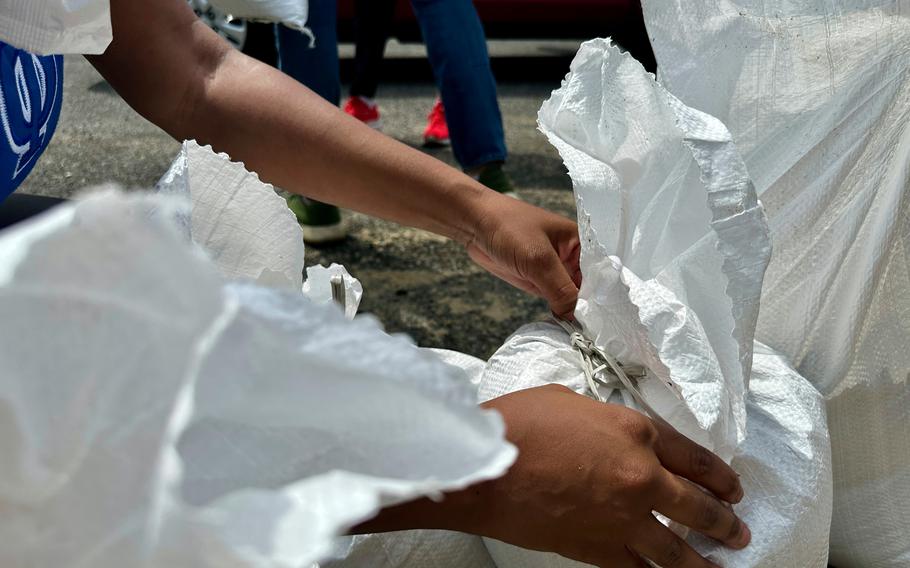
A volunteer prepares a sandbag for New Orleans residents, Wednesday, July 16, 2025, anticipating heavy rain from a tropical weather system moving toward the Gulf Coast. (Stephen Smith/AP)
The weather system moving across the Florida Panhandle on Wednesday was showing a greater chance of becoming a tropical depression as it moves toward the northern Gulf Coast, according to the National Hurricane Center.
The system has a 40% chance of becoming a tropical depression as it moves west over the Gulf toward southeastern Louisiana on Thursday, the federal agency said. The severity of its impact will depend on how far it travels offshore, where conditions are ripe for a tropical depression, before reaching Louisiana. The tropical weather will affect Alabama and Mississippi as well.
Regardless of whether the system intensifies, heavy downpours could cause flooding, officials warned.
New Orleans is bracing for 3 to 5 inches of rain through Saturday, but some areas could see as much as 10 inches, especially near the coast, the National Weather Service said.
“While a tropical depression cannot be ruled out near the coast on Thursday, the main focus remains the heavy rain threat,” the agency wrote on X.
Volunteers and local elected officials played music as they shoveled sand into bags to hand out to residents in New Orleans on Wednesday morning at the Dryades YMCA.
“My street flooded just the other day when we got a little bit of rain and so I want to just make sure that I’m proactive,” New Orleans resident Alex Trapps said as he drove away with sandbags in his car.
The looming threat in the southeast comes on the heels of a series of lethal floods this summer. On Monday, flash floods inundated New York City and parts of New Jersey, claiming two lives. And at least 132 people were killed in floodwaters that overwhelmed Texas Hill Country on the Fourth of July.
The system percolating over Florida will be called Dexter if it becomes a named storm. Six weeks into the Atlantic hurricane season, which runs from June 1 to Nov. 30, there have been three named tropical storms — Andrea, Barry and Chantal — but no hurricanes.
Chantal made landfall in South Carolina last week, and its remnants caused flooding in North Carolina that killed an 83-year-old woman when her car was swept off a rural road.
The National Oceanic and Atmospheric Association said in May there was a 60% chance that there will be more named storms this hurricane season than there have been in past years on average.
The currently developing weather system is expected to move fully inland by the end of the week.
Southern Louisiana — a region all too familiar with the potentially devastating impacts of flooding — is expected to be hit hardest Thursday and beyond.
Erika Mann, CEO of the Dryades YMCA, said that local elected officials managed to organize the storm supply distribution within a day after the threat intensified.
“We open our doors and help the community when the community is in need,” Mann said.
Some residents who came to get supplies “jumped out of their cars and they helped. And it just represents what New Orleans is about. We come together in crisis,” Mann said.
Riddle is a corps member for The Associated Press/Report for America Statehouse News Initiative. Report for America is a nonprofit national service program that places journalists in local newsrooms to report on undercovered issues.